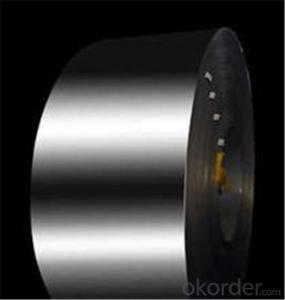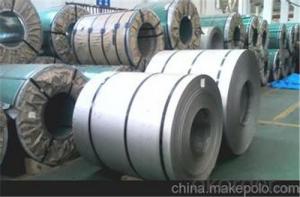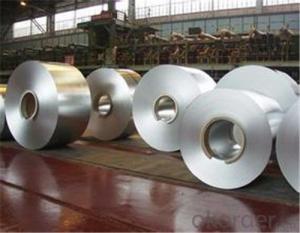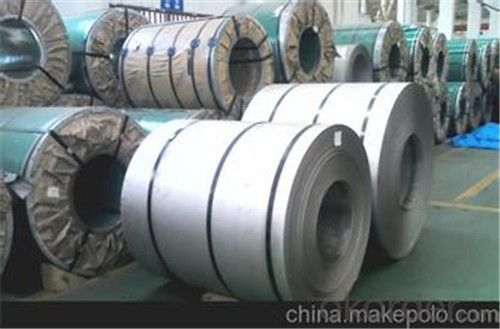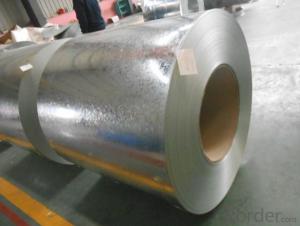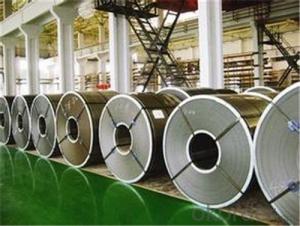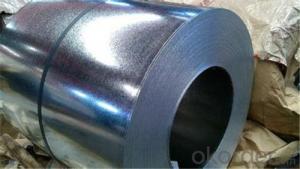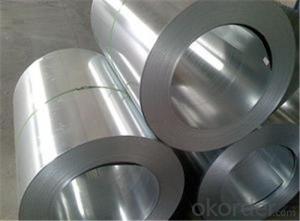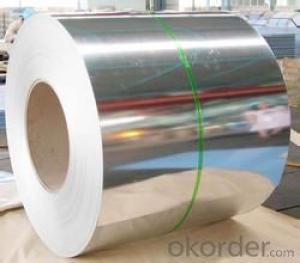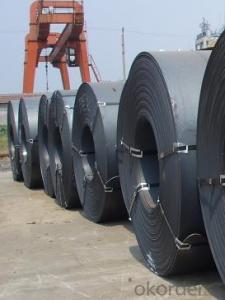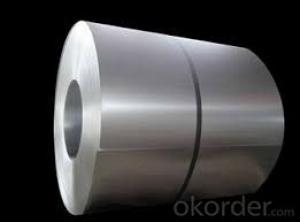Galvanized/ Auzinc Steel -SPCC in China from CNBM
- Loading Port:
- Tianjin
- Payment Terms:
- TT OR LC
- Min Order Qty:
- 100 m.t.
- Supply Capability:
- 5000000 m.t./month
OKorder Service Pledge
OKorder Financial Service
You Might Also Like
Description:
Hot-dip aluzinc steel sheet is substrated on cold rolled steel (CRC) in various strength and specification. Coating composition is 55% aluminum in weight ratio, 43.4% zinc, and 1.5% silicon, with excellent corrosion and heat resistance performance.
Specifications:
1.Mateials:SGCC,DX51D / DX52D /S250,280GD
2.Size:width:600-1250mm(900mm,1215mm,1250mm,1000mm the most common)
thickness:0.15-2.0mm
length:1000-6000mm,as your require
3.Zinc coating :60-180g( as required)
4.Coil id:508mm
5.Coil weight: 3-5MT(as required)
6. Surface:regular/mini/zero spangle, chromated, skin pass, dry etc.
Applications:
Galvalume Coil widely used for roofing products, It is also the ideal base material for Prepainted Steel Coil.
1. roofing
2. gutters
3. unexposed automotive parts
4. appliances
5. furniture
6. outdoor cabinetry
Images:
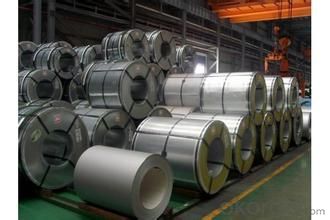
Production of cold formed corrugated sheets and profiles for roofing, cladding, decking, tiles, sandwich walls, rainwater protective systems, air conditioning duct as well as electrical appliances and engineering.
FAQ
1.What's your MOQ?
50MT, it is for one container.
2.Whether your company have QC teams?
Yeah, sure, our QC team is very important, they will keep the quality control for our products.
3. What's your normal delivery time?
Our delivery time about 10-20days for standard sizes, if you have other requirements like hardness and width ,it is about 20-40days. But don't worry ,we also try our best for the
- Q: What is the role of steel coils in the manufacturing of agricultural machinery?
- Steel coils are essential in the manufacturing of agricultural machinery as they are used to form various components such as frames, chassis, and structural supports. These coils provide the necessary strength, durability, and rigidity required to withstand the demanding conditions and heavy workload typically encountered in the agricultural sector.
- Q: How are steel coils used in the production of marine vessels?
- Due to their strength, durability, and versatility, steel coils find extensive use in the production of marine vessels. These coils, typically made of high-quality steel, possess the ability to withstand harsh marine environments and resist corrosion. The construction of the hull is one of the primary applications of steel coils in marine vessel production. Welding together steel coils that have been formed into plates creates the hull structure. The coils' strength ensures that the hull can endure the extreme forces and pressures encountered during vessel operation, including rough seas and heavy cargo loads. Furthermore, steel coils are employed in the production of various components and fittings within marine vessels. These coils can be shaped, cut, and formed into different parts like bulkheads, decks, and superstructures. The versatility of steel enables manufacturers to create intricate shapes and structures necessary for the efficient and safe functioning of a marine vessel. Moreover, steel coils are also used for fabricating pipes and tubing systems within marine vessels. These pipes are crucial for tasks such as fluid and fuel transportation, as well as ventilation throughout the vessel. The strength and corrosion resistance of steel coils ensure that these pipes can endure the high pressures and corrosive nature of marine environments. Additionally, steel coils are utilized in the production of marine vessel equipment like winches, cranes, and anchor systems. The components demand a material with high strength that can withstand heavy loads and constant use. Steel coils provide the necessary strength and durability to ensure the reliable performance of these vital equipment. In conclusion, steel coils play a crucial role in the production of marine vessels. Their strength, durability, and versatility make them an ideal material for constructing the hull, manufacturing various components, fabricating piping systems, and creating equipment. The use of steel coils guarantees the safety, efficiency, and longevity of marine vessels, enabling them to navigate the challenging conditions of the open seas.
- Q: Looking for a new entry door for my home If someone would explain the features and benefits of both fiberglass and steel doors I would greatly appreciate it!!
- Fiberglass doors insulate better than the steel doors and they do not dent or rust. Go with fiberglass.
- Q: What are the limitations of using steel coils in certain applications?
- One limitation of using steel coils in certain applications is their susceptibility to corrosion. Steel coils can rust when exposed to moisture or harsh environments, which can affect their structural integrity and performance. Additionally, steel coils can be heavy and bulky, making them less suitable for applications that require lightweight materials or intricate designs. Finally, steel coils may not be suitable for applications that require specific electrical or thermal conductivity properties, as steel is not the most conductive material in these aspects.
- Q: How are steel coils protected from chemical damage?
- Steel coils are typically protected from chemical damage through the application of a protective coating or by storing them in a controlled environment to prevent exposure to corrosive substances.
- Q: How can I owe a Pre-engineered Steel Building?
- You just have to do small efforts for owing a steel building: Firstly you have to finalize a steel building company for construction work. After finalizing the steel building company, the next step is the paperwork - the agreements and contracts. Some steel building companies may also ask for a verbal approval for the factories to get the work started.
- Q: How do you prevent damage to steel coils during transportation?
- To prevent damage during the transportation of steel coils, there are several measures that can be taken: 1. Tight and secure packaging: It is important to pack the steel coils tightly and securely to prevent any movement or shifting during transportation. This can be achieved by using appropriate packaging materials such as steel cradles, wooden dunnage, or steel straps to hold the coils in place. 2. Use cushioning materials: Adding cushioning materials like foam padding, cardboard, or bubble wrap between the coils can help absorb shocks and vibrations during transit. This additional layer of protection minimizes the risk of scratches, dents, or other damages caused by contact with other objects or surfaces. 3. Handle and load properly: It is crucial to use proper lifting equipment and techniques to avoid mishandling and dropping of the steel coils. Carefully lifting and loading the coils onto transportation vehicles using forklifts or cranes is recommended. Additionally, stacking the coils in a way that distributes weight evenly helps maintain stability. 4. Protect from weather: Steel coils are susceptible to corrosion, so it is essential to shield them from moisture and adverse weather conditions during transportation. Covering the coils with waterproof and weather-resistant tarps or shrink wrap prevents water or moisture from reaching the steel surfaces. 5. Regular inspections: Conducting regular inspections before, during, and after transportation is vital to identify any potential damage or issues. This allows for timely intervention to rectify any problems and prevent further damage. 6. Trained personnel: It is crucial to ensure that personnel involved in handling, loading, and transporting the steel coils are properly trained. They should be knowledgeable about the correct procedures and techniques to safely handle and transport the coils, reducing the risk of damage. By implementing these preventive measures, the likelihood of damage to steel coils during transportation can be significantly reduced, ensuring that the coils reach their destination in optimal condition.
- Q: How do steel coils contribute to the water and wastewater industry?
- The water and wastewater industry heavily relies on steel coils as a crucial component for constructing and maintaining its infrastructure. These coils, made from high-quality steel, offer numerous advantages for the industry. To begin with, steel coils are essential in the production of pipes and tubes used primarily for transporting water and wastewater. Steel pipes are renowned for their exceptional strength and durability, enabling them to withstand high pressure and heavy loads. This makes them ideal for water distribution systems, sewage networks, and treatment plants. Steel coils provide the necessary material to manufacture these pipes, ensuring reliable and long-lasting infrastructure. Furthermore, steel coils are also utilized in constructing storage tanks and reservoirs. These tanks are vital for water treatment plants, serving as storage for large volumes of water or wastewater during the treatment process. Steel coils provide the required material for fabricating these tanks, guaranteeing their structural integrity and preventing leaks or contamination. Moreover, steel coils are used in manufacturing various equipment and components indispensable in the water and wastewater industry. For instance, steel coils are employed to produce pumps, valves, and control systems, which are crucial for the efficient operation of water treatment plants, pumping stations, and sewage networks. Steel's strength and corrosion resistance make it an ideal material for these applications, ensuring reliable and long-lasting equipment. Additionally, steel coils are also employed in constructing wastewater treatment plants and facilities. These plants employ various processes to eliminate contaminants from wastewater before discharging it into the environment. Steel coils provide the necessary material for constructing these facilities, including structural supports, tanks, and other components. The durability and resilience of steel ensure the longevity and efficiency of these treatment plants. In conclusion, steel coils play an integral role in the water and wastewater industry by contributing to the construction and maintenance of critical infrastructure. They are used in manufacturing pipes, tanks, equipment, and facilities, guaranteeing the strength, reliability, and durability required for the efficient operation of water and wastewater systems.
- Q: What are the common maintenance practices for steel coils?
- Common maintenance practices for steel coils include regular cleaning to remove dirt, dust, and other contaminants, inspection for any signs of corrosion or damage, proper storage to prevent moisture and rusting, and regular lubrication of moving parts to ensure smooth operation. Additionally, it is important to handle and transport the coils with care to avoid any bending or distortion.
- Q: Search the internet for 'Frost Clipper Knife'. This knife comes in either stainless or carbon steel. I have a friend who has one (stainless steel) and he is very impressed with it, but I have heard that Carbon Steel blades are better? Discuss...
- There are different grades of Carbon Steel. A good grade is much harder than Stainless Steel and will stay sharp longer. It is also many times harder to get an edge on than Stainless Steel. I have had both and prefer the Stainless Steel because eventually the Carbon Blade does get dull, and you will wear out a Whet Stone trying to put the edge back on it. The Stainless Steel holds an edge an acceptable amount of time and is easier to sharpen when the time comes. Putting either knife through a can opener sharpener will ruin the edge and make it almost impossible to put another edge on the knife. Look closely and determine the angel of the bevel, then lay the knife bevel flat on a good whet stone and try to take a thin slice off of the stone. Turn the knife over and do the other side so you keep the edge centered on the blade. Keep turning the knife over and taking thin slices until it is sharp. Dress with a good quality sharpening steel.
Send your message to us
Galvanized/ Auzinc Steel -SPCC in China from CNBM
- Loading Port:
- Tianjin
- Payment Terms:
- TT OR LC
- Min Order Qty:
- 100 m.t.
- Supply Capability:
- 5000000 m.t./month
OKorder Service Pledge
OKorder Financial Service
Similar products
Hot products
Hot Searches
Related keywords
